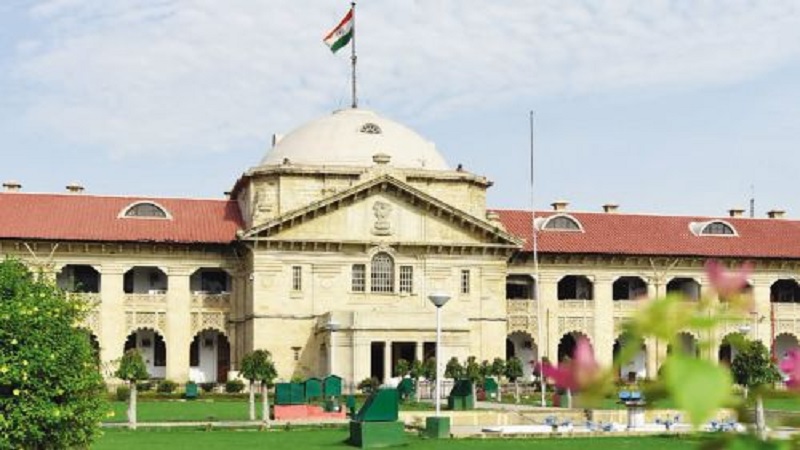 Image Courtesy:livelaw.in
Image Courtesy:livelaw.in
Justice Pankaj Bhatia of the Allahabad High Court has held that change of name is an expression guaranteed under Article 19(1)(a) and 21 of the Constitution of India.
“The individual ‘name’ is a facet of right of expression, which is guaranteed under Article 19(1) (a) read with Article 21 of the Constitution of India. The freedom of expression as guaranteed under Article 19(1) (a) includes within its sweep all forms of expressions and name in the present world is clearly a strong expression”, said the Single Bench.
The court was hearing a petition filed by a student who had appeared in the Secondary School Examination in the academic 2011-12 conducted by the Central Board of Secondary Education (CBSE) Delhi. He got a notice published in the Gazette of India for changing his name from Rishu Jaiswal to Kabir Jaiswal.
In his plea, he mentioned that he got his name changed in his Aadhar Card, PAN card and even got the official Gazette notification. But when he tried to get the name changed in his CBSE certificates, the Board rejected this request on the grounds that the name change had not been reflected in the school records.
The Counsel appearing for CBSE argued that the request for the name change cannot be made as per Rule Nos. 69.1 (i) and 69.1 (ii) of the examination byelaws. The rules are related to obtaining permission to make a change in the candidate’s/ mother’s/ father’s name. To get the name change application approved, the request has to be submitted before the Board either prior or following the publication of the result. The request can only be approved if it “is at variance with the names so recorded in the School records”.
But the court rejected this contention and said that the matter will be decided only on the grounds of reading the bye-laws as the matter is to be decided only on interpretation of the rules applicable. The court referred to two judgments by the Kerala and Delhi High courts to understand the matter better.
Kailash Gupta v CBSE 2020 SCC Online Ker 1590, clearly stated that to have a name and to express the same in the manner, a person wishes, is a part of the right of the freedom of speech and expression under Article 19(1)(a) as well as right to liberty under Article 21 of the Constitution of India. In the said judgment, the Kerala High Court was dealing with the scope of Rule 69.1(i) of the Rules of the CBSE and the Court had permitted the change of name prior to the declaration of result by CBSE by holding the same to be a right flowing under Article 19(1) (a) and Article 21 of the Constitution of India.
The Kerala High Court observed, “Name is something very personal to an individual. Name is an expression of one’s individuality, one’s identity and one’s uniqueness. Name is the manner in which an individual expresses himself to the world at large. It is the foundation on which he moves around in a civil society. In a democracy, free expression of one’s name in the manner he prefers is a facet of individual right. In our Country, to have a name and to express the same in the manner he wishes, is certainly a part of right to freedom of speech and expression under Article 19 (1) (a) as well as a part of the right to liberty under Article 21 of the Constitution of India”.
It further referred to a similar order by the Delhi High Court in Rayaan Chawla v. University of Delhi & Anr W.P. (C ) No. 6813 of 2020 wherein the Delhi University on the basis of a notification dated August 1, 2015 refused to permit the petitioner to have his name changed on the ground that in terms of the notification, the student is firstly required to get the name changed in the records of the CBSE. The Court held that it was impossible to get the name changed in the CBSE records as the regulations in question do not permit the same, however, it directed the University of Delhi to permit the petitioner to change the name.
The Allahabad High Court now had to decide whether CBSE byelaws can be used to take away or restrict the rights enshrined under Article 19 (1)(a) of the Indian Constitution.
It noted that CBSE is a Society, registered under the Societies Registration Act, and is governed by the Bye-Laws. The Court said that when the notification issued by the Examination Committee on February 1, 2018 is combined with the fact that CBSE is a society, it is clear that CBSE rules “do not have any statutory flavour.”
The Court further acknowledged, “The right enshrined under Article 19(1) (a) of the Constitution of India are fundamental rights and can be taken away or restricted only in accordance with the procedure prescribed under Article 19(2) of the Constitution of India.”
The Allahabad High Court while noting that different names in different records will lead to undue hardship to both the petitioner and the respondents, directed CBSE to change the name of the petitioner in their records as ‘Kabir Jaiswal alias/nee Rishu Jaiswal’ and to issue a fresh certificate to the petitioner, recording the name as directed above, within two months.
The order may be read here:
Related:
Contemporary artists raise key questions about freedom of speech and expression
Unite in defence of the Rule of Law & Article 19, senior bureaucrats tell Indians